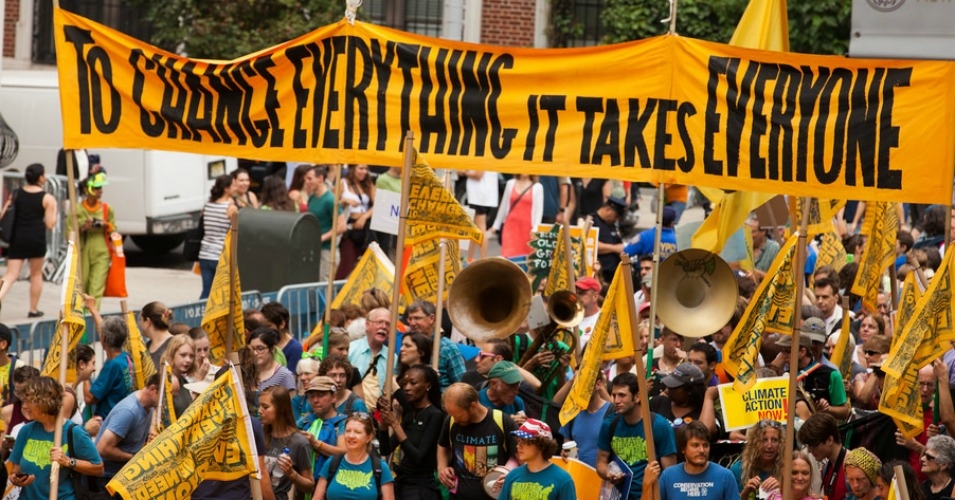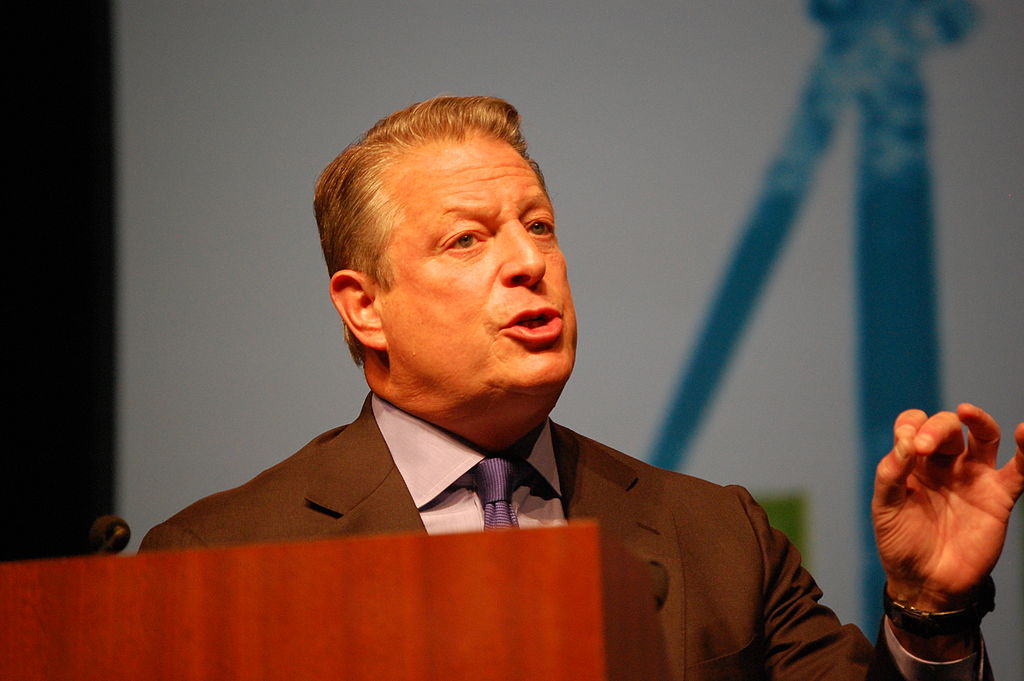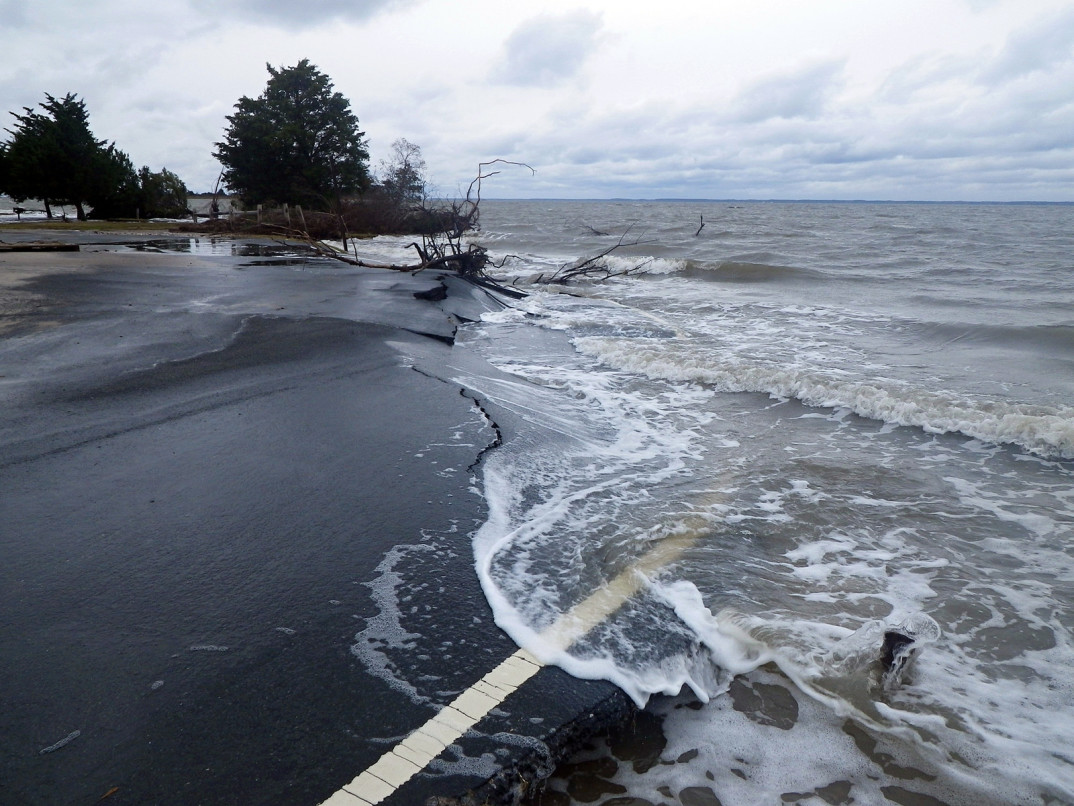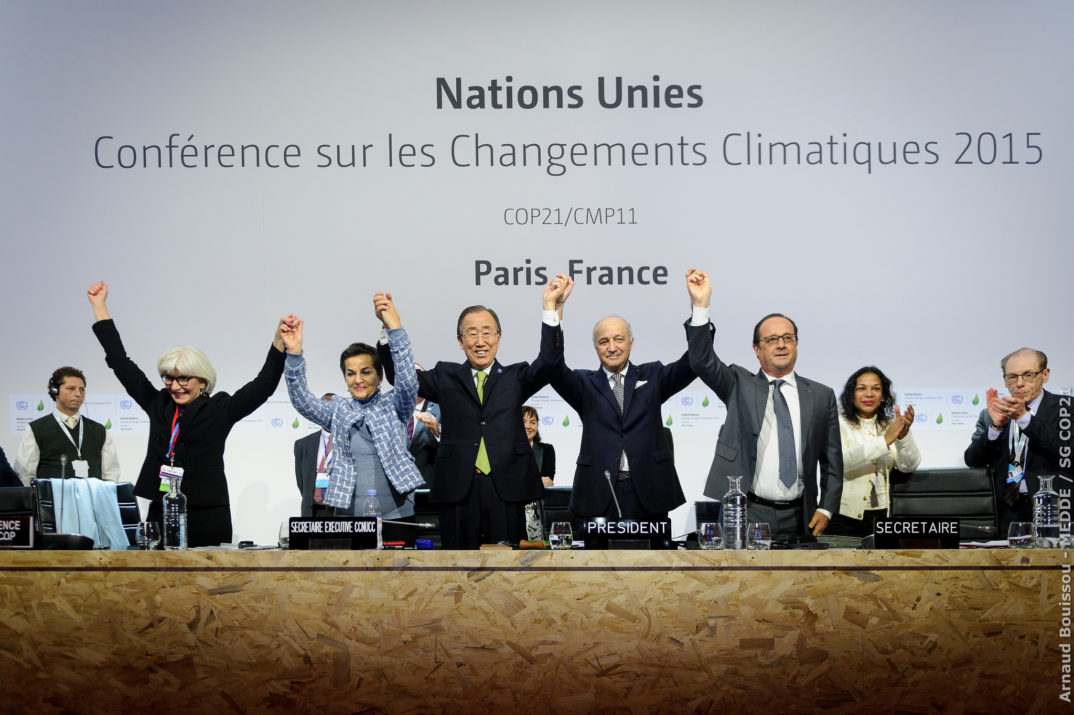On a day that ironically, or appropriately, broke temperature records, over 200,000 people flocked to the nation’s capital to participate in The People’s Climate March. The march date coincided with President Trump’s 100th day in office, often considered a landmark in every presidency. However, President Trump was not present to observe the massive demonstration, but instead held rallies in support of his presidency in Harrisburg, Pennsylvania. Regardless of Trump, the People’s Climate March aimed to send a bigger message about the importance of environmental protection and climate action. However, like any large protest, the motivations and perspectives of individuals participating differed.
Is Activism the Most Ethical Way to Fight Climate Change?
Mere days away from The People’s Climate March in Washington D.C., at least 100,000 people are estimated to march in the streets. One quick Google search of “Climate March D.C.” turns up dozens of articles on why marching next Saturday is important. However, in terms of social activism, and specifically climate change, is protesting a true form of advocacy? Much of the climate march this year is focused on “fighting back,” specifically against the Trump administration. But is turning the environmental movement into a direct political one ethical? And what is the danger in turning a movement into a large-scale march?
Continue reading “Is Activism the Most Ethical Way to Fight Climate Change?”
Kim Stanley Robinson’s Aurora and Intergenerational Responsibility
Editor’s note: this article contains spoilers for Aurora.
Aurora, the most recent novel by the science-fiction author Kim Stanley Robinson, focuses on the long-distance voyage of Earth’s first interstellar generation starship. A generation starship is a spaceship designed to sustain a small human population stuck on the ship for several generations. This generation ship is travelling 11.9 light years to the Tau Ceti system, a voyage that takes them roughly 200 years to complete. Thus, the inhabitants of the ship that we meet are not those individuals who signed up willingly for the expedition, but rather the descendants of their descendants.
Continue reading “Kim Stanley Robinson’s Aurora and Intergenerational Responsibility”
Evaluating Climate Change’s Post-Election Importance
Former Vice President Al Gore is making headlines after his meeting with President-elect Donald Trump on December 5th. After the meeting, he sat for an interview with the Guardian about their conversation and the election in general. In the interview, Gore stated that, for the sake of the environment, we do not have “time to despair” over the results of the election and that “despair is just another form of denial.” Gore is known for his environmental activism, most specifically his documentary, “An Inconvenient Truth,” which highlighted the urgency of climate change in 2006. Gore even won the 2007 Nobel Peace Prize for his efforts to combat climate change. Though many environmentalists might agree with Gore, are his statements acceptable? Is it fair to compare grief from the election to denial? And is Gore failing to recognize the marginalized identities that are at stake as a result of the election?
Continue reading “Evaluating Climate Change’s Post-Election Importance”
Is the Paris Agreement Ethical?
As the COP22 (a conference where world leaders gather to discuss climate policies) took place in Marrakech a few weeks ago, environmentalists were optimistic about the enforcement of the Paris agreement: 195 countries are committing to keep global temperatures at two degrees above pre-industrial levels. Although some more radical environmentalist groups complain this deal is insufficient, it is widely announced by world leaders as a major breakthrough in the struggle against global warming.
Who Owns Climate Change?
Two days after the 2016 presidential election, John Abraham published an article on the Guardian titled “Conservatives elected Trump; Now They Own Climate Change.” In the article, Abraham claims that conservatives now “own” climate change due to Trump’s victory and the lack of action from conservative politicians, both in the United States and around the world. But is it fair to blame any person, group, or ideology for climate change? And if so, how can we determine who we should hold accountable?
Future of the Environment Under a Trump Presidency
This past week, following his presidential victory, president-elect Donald Trump named Myron Ebell, a staunch dissenter on climate change, as his head of transition committee for the Environmental Protection Agency (EPA). Alongside Ebell’s nomination, Sarah Palin and Forrest Lucas have been names mentioned in possible positions within the Department of Interior and Department of Energy. The implications these nominations hold for the future of American environmental policies and climate carry major weight. To fully digest these implications, one must look into Trump’s environmental stances and those of his possible future nominations.
Continue reading “Future of the Environment Under a Trump Presidency”
This & That: Assisting Evolution
In a recent piece entitled Unnatural Selection published in the New Yorker, Elizabeth Kolbert writes of the challenges confronting conservation as the world moves into a new, warmer, more acidic equilibrium as a result of human-induced climate change. In her piece, Kolbert profiles two ongoing efforts to genetically-modify wild species for the purpose of regenerating natural populations. Should humans assist evolution in an attempt to fix the detrimental effects of climate change?
It’s Time to Rethink Our Water Use
Originating high in the Rockies north of Boulder, the Colorado River travels 1,450 miles to Mexico. It is a symbolic keystone of the American Southwest, known for carving the Grand Canyon and surrounding landscapes. The reality is that its water is essential for everyday life in the arid states of Arizona, California, Colorado, New Mexico, Nevada, Utah and Wyoming. 33 million people depend on it for their primary water supply. It water supports farms, ranches, cities, suburbs, tourism and a $26 billion recreation industry.
While it known for its beauty and symbolism, it is also famous for the ways in which it has been exploited. As written in The Colorado River: Flowing Through Conflict, “It is the most contested, played-upon, silt-laden, diverted, engineered, dammed, stored (four times its volume and one-fifth of its length is held in reservoirs), farmed with, and metro-dependent river in America.”
For millions of years, the Colorado River ran to the Sea of Cortez, yet this came to halt in 1998. Due to an increasing population and a changing climate, demand for its water is way higher than its supply. 12 major dams and countless aqueducts divert its water for a wide array of uses. Among the largest perpetrators is the agriculture industry, which uses unsustainable techniques to convert desert soil into food production- ensuring that us Hoosiers have unlimited access to spinach in January and February. Similarly, there are countless golf courses and backyard pools in Arizona and New Mexico- clear examples of how were are not working within the constraints of the environment. I would argue that the over-exploitation of the Colorado River is reflective of a trend of unsustainable water usage in our country, and highlights certain ethical questions surrounding environmental exploitation and climate change.
While it is true that water is essential for the life of every human, the ways in which this resource is used varies greatly throughout the world. The average American uses about 2,000 gallons of water a day in the food they eat, energy they use, and products they buy. This is two times the global average. While millions of people spend a significant part of every day transporting the water they will use for hydration, cooking, and hygiene, others flick on a faucet and have immediate access to cold and clean water. There is an apparent disconnect in more developed societies from natural resources essential to daily life, and their origins. In her article, “The Missing Piece: A Water Ethic,” Sandra Postel argues that, “in our technologically sophisticated world, we no longer grasp the need for the wild river, the blackwater swamp, or even the diversity of species collectively performing nature’s work.” We have become so “sophisticated” as a society that we no longer value the importance of the river, just not for providing ecological services, but for sustaining our own human life. This disconnect may have extreme consequences in the coming years.
Ethical concerns about water management, highlighted by the exploitation of the Colorado River, center around stewardship and equity. The Tragedy of the Commons may be a beneficial tool in understanding part of the problem with water as a public resource. In this case, rational acts in self interest are irrational and harmful to the needs of the greater community. Postel further asserts that “our stewardship of water will determine not only the quality but the staying power of human societies.” How do you convince societies to sacrifice some comforts for the wellbeing of people who have not yet been born? In terms of water, the time table might be even shorter. In this case, the question is not about leaving a habitable planet for future generations, but ensuring that, within our lifespans, we leave enough water for our older selves.
Water is a renewable resource, given that we do not extract it past a sustainable yield. For rivers, this means understanding the processes that create them, and working within the boundaries of sustainability. The exploitation of the Colorado River is a clear case of unsustainable water management. This will have significant consequences in the coming years, when this water is not only needed to fill our swimming pools, but to hydrate our citizens on the most basic level. Conflict over water rights will only increase in the coming years, as climate change continues to take its toll. Wars have been fought over oil as a resource, so it would not be surprising if conflicts over water management accelerated into violence.
I argue that, as a society, we must shift away from our current utilitarian view of water, which disconnects us from our most basic reliance on it as a species. We must confront our ever-growing demands of water and work within the ecology of freshwater systems to ensure a future for many species, including our own. Postel calls for a new ethic that says, “it is not only right and good but necessary that all living things get enough water before some get more than enough.” It will be a race against time for societies to collectively produce this new ethic before the environmental consequences of climate change have taken their full effect.
The Cost of Fast Fashion
The past thirty years have seen a rise in “fast fashion” – a system of mass production that “refers to cheap, trendy, and popular clothing chains which rapidly change their inventory and styles.” This system is what allows us to walk into Forever 21 or H&M and purchase a whole outfit for less than $50. But you do get what you pay for – these clothing articles often have loose seams are made with cheap fabrics. As many customers of these stores can attest, laundry day becomes a chore thanks to excess shrinkage, unraveling, and rapid degradation of the quality of the sweater, shirt, or dress. However, many consumers are undisturbed by this disposable clothing trend because in the fashion world, trends are ever-changing and often fleeting. It doesn’t matter that the trendy sweater you bought two weeks ago is becoming a tad threadbare, because it’s already out of style. These clothes are now so cheap that upon the emergence of a new trend, it is affordable to go out and newly stock your closet.
An indisputable attribute to this industry is that money and status are no longer barriers. A new video by AJ+ explains we are only spending about 3% of our income on clothing, explaining that in a time of vast socioeconomic inequality, almost everyone is able to participate in the “fashion for all” culture. But what is the real cost?
According to the aforementioned AJ+ video “Why H&M Costs More Than You Think” referenced by The Huffington Post, 85% of the used clothes that we throw away goes into landfills, while only around 15% is recycled or reused. “Textile dyes make up 1/5th of industrial water pollution, and it’s estimated that the apparel industry makes up 10% of the global carbon footprint.” If this doesn’t persuade you, the cheap textiles we buy are full of contaminants such as lead and carcinogens. Teenage girls are most often the group targeted by these clothing chains and are thus exposed to these contaminants whilst still in developing stages.
The consequences don’t end there – the practice of mass production perpetuates the exploitation of cheap labor. As most of you probably know, many workers, who are often children, in countries such as China and Bangladesh are working from dawn to dusk in dangerous conditions for less than a dollar. How have we been justifying the fashion industry’s malpractices for so long?
There are some social benefits to buying into the disposable clothing culture. Rates of clothing donation to organizations such as Goodwill and the Salvation Army has drastically increased. Many millennials who are laden with debt and struggling to enter the workforce are able to inexpensively stock their wardrobe with clothes that make them look presentable. However, is fast fashion justifiable when posited next to the dangerous working conditions and minuscule wages that make this practice possible? What about costs to the environment and the burden it places on future generations? It’s time we start asking what the real cost is of purchasing our wardrobes from these chains and questioning the implications of our whimsical consumerism and disposal tendencies.
Will climate divestment work?
Scott Wisor recently wrote a post titled “Why Climate Change Divestment Will Not Work” over at the blog for the journal Ethics & International Affairs (EIA). The post is quite provocative. Visit the EIA blog, here, to read it.
Wisor presents himself as convinced that climate change is happening, poses a grave threat, and makes ethical demands on us all. Nevertheless, as his title suggests, he believes that one prominent strategy for generating mass action on climate change is destined for failure: the movement – led by Bill McKibben and his 350.org – to get large universities and investment funds to divest from fossil fuel companies. If fossil-fuel divestment efforts are doomed to fail, then McKibben’s movement functions as a costly distraction from our pressing ethical obligation not just to act but to act effectively. As Wisor puts it, “why spend half a decade or more on a tactic that at best won’t make a difference? Why not direct attention to the more urgent and effective task of placing a price on carbon?”
I have a number of responses to Wisor’s specific arguments, but in this post I’d like to offer two more general reflections aimed at tempering his conclusions. The line of criticism I’ll be pursuing in this post is an odd one – that Wisor’s arguments and conclusions are all too plausible. More specifically, his argumentative target is ill-defined and appears too easily established. When looked at more closely, the real difficulties movements face in achieving success also require more nuanced arguments that a particular movement will fail.
My first point begins by noting that a sober look at the evidence certainly suggests that Wisor’s conclusion is likely to be true. Pick any successful social movement from the past – the civil rights movement, the movement for India’s independence from England, etc. Scholars of social change frequently note that while those movements were in process the odds seemed stacked against them. Moreover, even movements we know (with hindsight) to have been successful seemed destined to fail almost right up until they managed – somehow – to succeed. Indeed, all large scale and eventually successful movements for social change have faced armies of naysayers claiming that the tactics they employed (e.g., non-violent resistance in the cases I’ve mentioned) would not work and that those movements’ efforts served as distractions from other, allegedly more effective measures that people genuinely devoted to the cause should be supporting instead. Perhaps the most eloquent response to this kind of criticism comes in Martin Luther King Jr.’s justly famous “Letter from the Birmingham Jail.” We’re on your side, his critics said, but your tactics are wrong and will backfire.
Antonio Gramsci made a similar point in saying, “I’m a pessimist because of intellect, but an optimist because of will.” The idea in Gramsci’s quote is that rational reflection on the odds of social change will almost always result in a thoroughly justified pessimism. If you’re aware of the obstacles and think about the circumstances carefully you’re sure to come up with a thousand reasons why social change just doesn’t stand a chance. Gramsci acknowledges that effective advocates for social change need to face up to this grim fact. They need the “pessimism of the intellect” so that they know what they’re up against – without this they will be ineffective idealists tilting at windmills. But social change movements do sometimes succeed, and without the benefit of hindsight it’s extremely difficult to tell which movement, if any, is going to pull off a major victory. And that means that people devoted to the hard work of social change need more than just the pessimism that comes from clear-sightedness of the long odds we face. They also need the “optimism of the will,” the willingness to work against long odds with the hope and confidence that some apparently doomed strategy will eventually succeed. To quote Margaret Mead, “Never doubt that a small group of thoughtful, committed, citizens can change the world. Indeed, it is the only thing that ever has.” Without the benefit of hindsight, a strong case can be made that all social movements are doomed to failure, and if that is all Wisor is arguing in the case of the fossil fuel divestment movement then his arguments are both unsurprising and should be of little interest to committed and thoughtful activists. If Wisor is arguing for an interesting claim, it must be not just that we’re justifiably pessimistic about the divestment movement’s odds of success. He must argue for the stronger claim that the movement is actually tilting at windmills, that it is so clearly out of line with reality that it should be viewed as a waste of time even by those with intimate knowledge of the challenges all social movements face.
My second response to Wisor’s argument is generated by asking a simple question: when can we say that a movement has succeeded, that its efforts have “worked”? Wisor’s blog post seems to imply a very demanding standard for movement success – a movement must solve the problem it’s designed to address (in this case climate change). And if this is what success requires then once again Wisor is arguing for a conclusion that is simply too easy. It is widely acknowledged that there are no silver bullets with regard to large problems like this, and in the case of climate change it is also widely acknowledged that it’s too late to “solve” the problem anyway: what we’ve already done commits us to enough warming that dangerous impacts are already unavoidable. Of course, that doesn’t mean we can’t still succeed in mitigating climate change and heading off even more catastrophic impacts, but no one heading up the fossil fuel divestment movement is under the illusion that their efforts will “solve” the problem in this sense.
Still, this isn’t the only metric for success. Activists often view movement success not in these all-or-nothing terms but as, instead, accruing piecemeal, slowly, and building over time. A social movement that doesn’t “solve” its intended problem in the first sense may nevertheless raise awareness (and so make future solutions easier to institute). Movements may build networks of effective and motivated actors (who may work better together in the future because of their present experience). They may convert major institutions and groups to take stands that they otherwise would not have taken (and so, again, make future change more likely). And so on.
All of these things plausibly constitute social movements succeeding, but none of Wisor’s specific arguments for why the fossil fuel divestment strategy “will not work” undermine the idea that the movement has already succeeded – that it has “worked” far beyond the dreams of most movements. According to a report by Arabela Advisors, “181 institutions and local governments and 656 individuals representing over $50 billion dollars have pledged to divest to-date.” Think too of the marches, meetings, media attention, position papers, etc. the movement has generated, and what they mean for better advocacy for policies of all sorts in the future. The point is just that by reasonable standards the divestment movement is already a success, and nothing in Wisor’s piece suggests this movement (and others) can’t build (piecemeal, and bit by bit) on their successes in the future.
Moreover, it is important to note that when Wisor suggests alternative efforts that he thinks stand a greater chance of succeeding he mentions only a “price on carbon” and unspecified “regulatory efforts” to combat climate change. The problem here is that Wisor’s suggested solutions do not constitute ideas for building a movement. To generate a movement you need to mobilize masses of people and institutions and organize them around applying political pressure for change. Of course we should put a price on carbon – but how exactly does Wisor propose that we build the political movement to get that done? When Wisor has an idea for building a powerful movement around putting a price on carbon (or his favorite regulations) and he can show, further, that his new strategy is likely to generate more traction, enthusiasm, and support from grassroots activists and major institutions than the divestment movement has already succeeded in generating then will he have a strong real case for saying that there are more effective strategies we should be pursuing. Saying simply that we should put a price on carbon isn’t even in the same ballpark as building the movement to divest from fossil fuels, however. McKibben’s fossil fuel divestment strategy may not be a silver bullet guaranteed to succeed (no social movement in history ever has been, of course), but it has been a concrete and already effective strategy for bringing together a new, strong, and powerful coalition on climate.
I realize that my fairly general criticisms of Wisor’s post don’t address the specifics of his arguments. For all I’ve said here it remains possible that his specific objections to the fossil fuel divestment movement’s strategies are indeed damning. That is, I have not argued that the fossil fuel divestment movement is not tilting at windmills in a way that anyone who cares about climate action should shun, nor have I argued that it is only beset by the perfectly ordinary sort of “pessimism of the intellect” that beset all social movements (even ones that have succeeded). Still, I hope I’ve clarified the way in which Wisor’s argument seems to aim at a conclusion that is both too easy and too unsurprising. If his arguments are to be of service to his claimed allies in the incipient climate movement they will need to show more than just that there are good reasons for pessimism. He’ll need to show that the divestment movement tilts at windmills. With regard to the former task Wisor’s arguments (unsurprisingly) succeed. With regard to the latter task I’m much less sure.
We Love Leo. But Should We Trust Him?
When I say CLIMATE, you say CHANGE.
In the conversations about the environment, things seem to be doing just that…changing.
Fossil Fuel Divestment is a Moral Issue
Over the last year or so, the word divestment has taken on new meaning. Until recently, this term popularly referred to the movement in the 1970s and 80s to remove all investments from South Africa. The goal was to retract financial support for companies participating in Apartheid. Divestment now refers primarily to fossil fuel divestment: freezing and removing all investments in fossil fuel companies.
Why would the DePauw Community ask our Board of Trustees to divest from fossil fuels, and how is this issue related to ethics? In my eyes, the number one reason for divestment is to align the values and actions of an institution that I financially support (DePauw) with my own. Since the burning of fossil fuels is the number one source of greenhouse gas emissions, fossil fuel companies are culpable of driving the increased concentrations of GHGs in the atmosphere, and thus, climate change. Their crimes against the climate are becoming even more atrocious as they continue to drill for oil in remote and fragile places and as they resort to unconventional sources such as tar sands. While I fully understand that it is our demand for fossil fuels that is driving these actions, I think that we must look for ways to remove our support from this industry. This is only the first of many steps in the journey to move away from our carbon-central society and economy.
Some may argue against divestment saying that it will have no impact on fossil fuel companies. They argue that other people will buy up the stocks that DePauw sells. I agree that this is the case, but I don’t think that it is an argument against divesting. Divestment is a moral issue. It’s about acting in a way that is consistent with our values. In addition, through the process of divestment, we can educate the community about climate change and engage in open discourse about the issue. This is perhaps the most valuable part of the divestment movement.
We have made great headway on our divestment campaign at DePauw in the last month. We wrote President Casey a letter requesting divestment, which he promptly shared with the entire faculty. He even mentioned his intention to share it with the Board of Trustees. Additionally, we have two events in the next week. The first is a Divestment Rally in MeHarry Hall at 3pm on April 13th. Tricia Shapiro, author of “Mountain Justice”, will be joining us to talk about the coal industry’s impacts in Appalachia. Bill McKibben will also be skyping in to talk about his work with 350.org. The second event is a forum on Monday, April 15th in the Watson Forum. Joining us for a panel discussion will be Michelle Villinski from the Economics Department, Jen Everett from the Philosophy Department, and Jim Mills from the Geology Department. Divest DePauw, the group of students involved in this campaign, is immensely excited to engage in discourse with faculty and students on this topic.
Cool Talk About a Hot Topic: A Preview of This Week’s Events on the Ethics of Communicating about Climate Change
The Prindle Institute for Ethics is a proud and excited host of “Cool Talk about a Hot Topic:
The Ethics of Communicating about Climate Change,” a three-day symposium from Tuesday
to Thursday of this week that will “explore how scientific climate change findings are reaching
the public, how policy uncertainties are driven by the changes in mass and elite perceptions
of climate problems, and most of all, the ethical question of how we should try to talk to one
another about this urgent, but arguably overlooked and misunderstood, issue for our time.”
Kicking off the symposium this afternoon, Anthony Leiserowitz will present his opening
keynote, “Climate Change in the American Mind,” at 4:15 PM in Watson Forum. “Cool
Talk about a Hot Topic” brings together notable research scientists, lecturers, philosophers,
sociologists, geoscientists, political scientists, and feminist philosophers to address pressing
social, political, cultural, psychological, and economic issues embedded in the current
global climate crisis – along with key questions of governance, power, authority, and moral
responsibility – which, as our honored guests all concur in their research, is not only indisputably
real and anthropogenic in nature, but perhaps the most urgent and telling challenge of our time.
As Stephen Gardiner, philosopher and Wednesday’s afternoon speaker (with his talk, “Jane
Austen vs. Climate Economics,” at 4:15 PM in Watson Forum), argues in his 2012 article, “Are
We the Scum of the Earth? Climate Change, Geoengineering, and Humanity’s Challenge,” the
question of “who are we?” is central to this longitudinal and multidimensional problem. He
notes:
“If we ask what kind of person (or community, nation, or
generation) would impose risks of severe climate harms on others
under our current epistemic circumstances, we cast the issue in
a new, and starkly unflattering, light” (245).
Climate change is thus a critical ethical dilemma as much as it as a real harbinger and source of
negative physical consequences.
If ethics be the study of moral principles and the various degrees of agency of individuals and/
or groups that require or excuse the enactment of said principles in their daily lives, where
do we begin when it comes to communicating about climate change? In her 2003 article,
“Getting Closer: On the Ethics of Knowledge Production,” Chris Cuomo, feminist philosopher
and Thursday’s closing keynote speaker (with her talk, “Consciousness and Moral Action:
Considering Climate Change,” at 7:30 PM in the Prindle Auditorium), stresses the importance of
interdisciplinary research that can provide a more holistic frame for peeling back the many layers
of the massive, complex problem. She asserts:
“The project of getting closer involves attempts to bridge
knowledge and action by bringing thinkers, knowers, and actors
closer to the worlds affected by our actions and inaction”
(102).
In a sense, then, we aren’t planning for the future as much as we are planning for now, as the
current world we live in becomes further transmuted by rising global average temperatures and
carbon emissions. The answers won’t simply fall in our laps, so join the conversation this week
as we explore these and other questions, as well as possible solutions and alternative actions!












